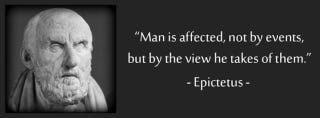The Uselessness of Stoicism in the Face of Death
Useful as therapeutics, Stoicism is useless as soteriology
Josef Pieper, Death and Immortality, trs. Richard and Clara Winston, Herder and Herder, 1969, p.101:
But the profound discord and hidden infirmity, with which the Stoic doctrine was already infected at its root in classical times, is nowhere revealed so baldly as in its attitude toward death. There is nothing surprising about this. The maxim not to let our hearts be affected and shaken by anything may on occasion be quite worthy of respect; but it must become absurd in the face of an event whose whole importance consists in shaking to the very depths not only the energies of our soul, but our existence itself.
The Stoics teach that there are things that are in our power, and things that are not. The flood that sweeps away my house is not in my power; but my response to the flood is. I can make myself miserable by blaming other people, from the president on down; or I can limit my suffering by taking control of my own mind. Your insulting me is not in my power; but whether or not I let it affect me is in my power.
The Stoics had a very important insight into the mind's power to regulate itself. When you really understand their point it can come as a revelation. I was once thinking of a dead relative and how he had wronged me. I began to succumb to negative thoughts, but caught myself and suddenly realized that I am doing it. In other words, I am allowing these negative thoughts to arise and I have the power to blot them out. The incident was years in the past, and the malefactor was long dead. So the present mental perturbation was entirely my own creation. My sudden realization of this — aided no doubt by my reading of Stoic and other wisdom literature — caused the disturbance to vanish.
In short, the Stoics discerned the mind's god-like power to regulate itself and master its thoughts rather than be mastered by them. They saw that, within certain limits, we create the quality of our lives. Within limits, we can make ourselves miserable and we can make ourselves blessed. There is an inner citadel into which one can retreat, and where a very real peace can be enjoyed -- assuming that one is willing to practice, rather than merely read about, the Stoic precepts.
The fundamental Stoic project, in the words of Pierre Hadot, is "the delimitation of our own sphere of liberty as an impregnable islet of autonomy, in the midst of the vast river of events and of Destiny." (The Inner Citadel: The Meditations of Marcus Aurelius, tr. Michael Chase, Harvard University Press, 1998, p. 83) We can beat a retreat to the inner citadel, the autonomous true self, the soul, the ruling principle (hegemonikon).
As useful as Stoic therapeutics is for everyday life, it is useless as soteriology. It can calm the soul, but not save it. For while the ruling principle has a god-like power to control its attitudes toward the blows of fate, it is not a god. It has no control over its own nature and existence. The Stoics leave us in the lurch in the face of death.
Pieper, then, is right. Death is not an external event that can be kept at mental arm's length and calmly contemplated from an inner 'safe space.' For no human space is safe from death. On Christian anthropology, man is mortal to the core.
I can to a certain extent identify with the hegemonikon or guiding element within me which stands above the fray, observing it. I am that ruling element, that transcendental witness. But I am also this indigent body, this wholly exposed mass of frailties. And try as I might, I cannot dissociate myself from it. The ideal of the Sage who negotiates with perfect equanimity fortune and misfortune alike is unattainable by us. In the end, the precepts and practices of Stoicism are unavailing.
We cannot save ourselves via the path of political activism as many 20th century Communists learned the hard way. But a wholly self-reliant quietism is also a dead-end whether Stoic or Buddhist. We cannot be lamps unto ourselves. If salvation is to be had, it must come from Elsewhere. Nur ein Gott kann uns retten, "Only a God can save us," as Heidegger said in his Spiegel-interview near the end of his life. But did he have the God of Christianity in mind? Perhaps not.



